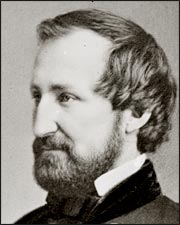Hoodwinked During America's Civil War: Union Military DeceptionCivil War Times | Published: June 12, 2006 at 8:17 pm |
|||
|
http://www.historynet.com/hoodwinked-during-americas-civl-war-union-military-deception.htm |
|||
| Throughout the history of warfare,
deception has played a pivotal role in the outcome of battles and
campaigns. From the Trojan Horse to our modern stealth technology,
there are no bounds to which combatants have not gone in their
attempts to dupe an unsuspecting foe into committing a fatal error.
What is interesting is that, however simple or complex they may be,
most well-executed ruses will succeed. Technology may change, but
human nature does not — and war is a very human occupation in which
the mind and the senses are easily tricked. This was certainly the
case during the Civil War. Occurring as it did in the midst of one
of the greatest transitional periods in the annals of combat, the
Civil War presented many opportunities for guile and trickery. This
is borne out by the abundant incidents of deception found throughout
the Official Records, as well as memoirs, letters and even
war literature. A sampling of the ruses adopted by Union forces is
presented here, in the first of a two-part series. 'All three corps are crossing the mountains…I think we shall deceive the enemy as to our point of crossing. It is a stupendous undertaking.' With these words, Union Maj. Gen. William S. Rosecrans inaugurated one of the most brilliant strategic deceptions of the entire war. The date was August 16, 1863, and as he stepped off on what would come to be known as his Chickamauga campaign, Rosecrans' primary objective was to get his army across the broad Tennessee River. This he hoped to accomplish without being detected by Confederate General Braxton Bragg, whose forces were then situated on the opposite bank at the strategically important rail center of Chattanooga. In Napoleonic style, Rosecrans sent the bulk of his army on a wide southwesterly sweep toward a series of river crossings. To draw Bragg's attention away from this movement, he ordered Brig. Gen. William B. Hazen to feint an attack on Chattanooga. Spearheading Hazen's advance was Colonel John T. Wilder's mounted Lightning Brigade. Using obscure trails, Wilder's troopers covertly made their way east before finally veering south toward Chattanooga, capturing a considerable number of bewildered Rebels along the way. Over the course of the next three weeks, the imaginative Wilder was instrumental in convincing Bragg that Rosecrans was moving in force against Chattanooga from the north. This episode is perhaps best described in Wilder's official report: 'We then commenced making feints as if trying to cross the river at different points for 40 miles above the town, and succeeded in so deceiving them as to induce them to use an entire army corps to prevent the execution of such a purpose….Details were made nearly every night to build fires indicating large camps, and by throwing boards upon others and hammering on barrels and sawing up boards and throwing the pieces in streams that would float them into the river, we made them believe we were preparing to cross with boats.' Entirely taken in by Wilder's scheme, Bragg held to his conviction that the main enemy thrust would come from the north, despite reports of Federal crossings to the south of Chattanooga. By the time Bragg realized he had been hoodwinked, it was too late. Screened by 9,000 cavalrymen, Old Rosy's columns had crossed the river virtually unimpeded and were now poised on the Confederate rear, thus rendering Chattanooga untenable. On September 7, Bragg reluctantly abandoned the railhead. 'Chattanooga has been taken without a struggle,' wrote an exultant Rosecrans on the 9th. His elation would be short-lived, however. Barely two weeks later, Rosecrans watched almost helplessly as fate turned its back on him during the ensuing debacle that took place along the banks of Chickamauga Creek.
In many respects Rosecrans' maneuver around Chattanooga had mirrored Maj. Gen. Ulysses S. Grant's Vicksburg strategy only four months earlier. By his use of various feints, including Colonel Benjamin Grierson's celebrated raid through central Mississippi, Grant managed to divert the enemy's attention while his columns marched south along the west bank of the Mississippi and crossed over at Bruinsburg. Unlike Rosecrans' ill-fated campaign, Grant's endeavors would culminate in the siege and eventual downfall of Vicksburg, as well as the surrender of 29,000 Confederates. If Rosecrans' exploits illustrate anything, it is that the Confederates did not hold a monopoly on subterfuge. Given the opportunity, Yankees could be just as crafty as their Southern counterparts, proving it over and over again at such places as Vicksburg, South Mountain and Chattanooga. In his book Chancellorsville, Stephen W. Sears recounts how even the indomitable Robert E. Lee was treated to some of his own medicine in April 1863. |
|||
Return to Rosecrans, Part 5, Post War Years |
(11/27/2010) |
||
